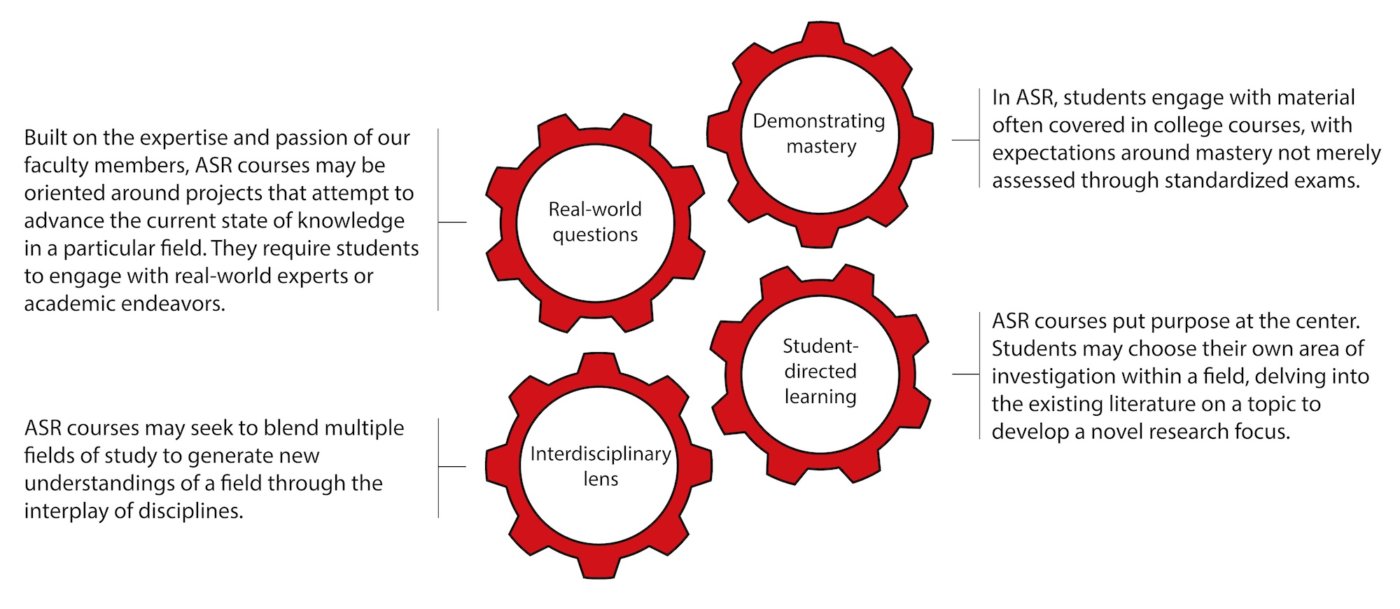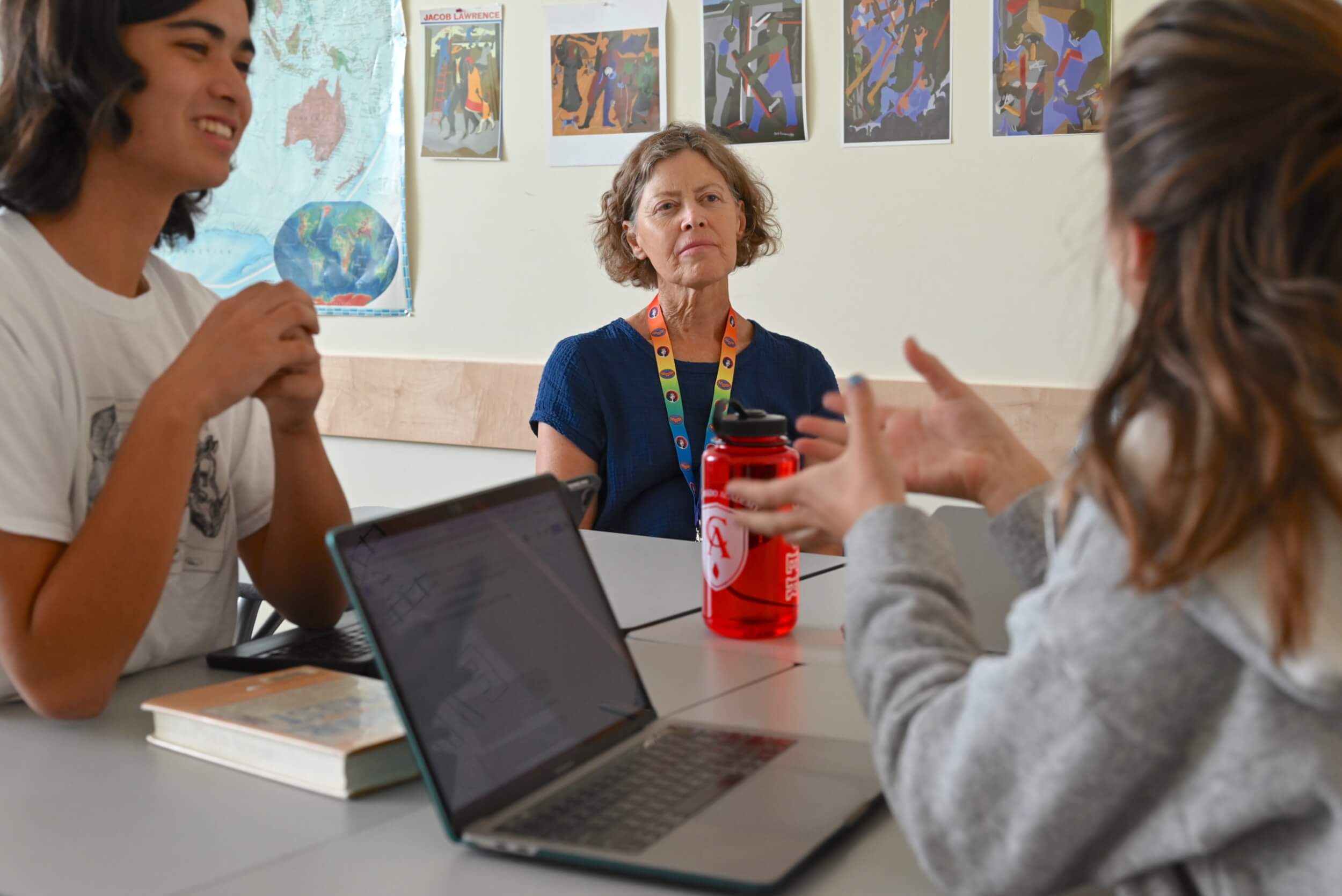This fall, in veteran social studies teacher Elissa Wolf-Tinsman’s new course, The American Experiment, Colorado Academy Seniors are analyzing the central events, people, and forces that transformed American society and culture from the years after World War II to the present. It was a period when several critical events and debates rocked the nation, such as civil rights, involvement with war and other nations, partisanship, and urban crises.
With a particular emphasis on the use of primary sources, in-depth exploration of topics, and historical scholarship, Wolf-Tinsman explains, the discussion-based, college-level course aims to help students learn how to write persuasively about complex material, while gaining a deeper appreciation for the lasting influence of the major events, crises, and interpretations of post-World War II American history.
As the first of CA’s own Advanced Studies and Research (ASR) courses to be offered, The American Experiment heralds the start of an ambitious extension of CA’s mission.
Developed by CA’s Upper School academic leadership, ASR harnesses the energy of a dynamic faculty and inspires authentic, rigorous engagement. ASR courses will boldly extend learning at CA, moving beyond College Board Advanced Placement (AP) classes that are constructed around an established curriculum designed to prepare students for cumulative exams.
“ASR puts students and purpose at the center, emphasizing self-direction,” says Upper School Principal Max Delgado. “It cultivates mastery, more profound depth of study, and a learning posture that connects to the broader world.”
According to CA Senior Dori Beck, “A course like The American Experiment has the speed and workload of an AP class, but there is also the time and space for students to explore what interests them the most.”
The anatomy of ASR
Built on the expertise and passion of CA faculty members, ASR courses may be oriented around projects that attempt to advance the current state of knowledge in a particular field, requiring students to engage with real-world experts or academic endeavors. ASR courses may seek to blend multiple fields of study to generate new understandings through the interplay of disciplines. Students may choose their own area of investigation within a field, delving into the existing literature on a topic to develop a novel research focus.

Through ASR, students encounter expectations around mastery not merely assessed through standardized exams.
“By offering students methods to demonstrate what they’ve learned in ways that reach beyond traditional assessments and memorization, they gain the confidence to face an increasingly complex and changing world,” says Delgado.
“It is incredibly exciting to allow teachers to teach what they love and what matters to students over the course of four years,” says social studies teacher and department chair Liz Sarles. “It really opens up for kids where their passions might lead them in terms of college and perhaps their careers.”
Sarles’ Honors elective, Diseases that Have Changed the World, asks Upper School students to examine the impact of the COVID-19 pandemic through the lenses of history, global health, statistics, literature, geography, and sociology. In part, it is courses such as Sarles’ advanced elective that have set the stage for CA to review and enhance the Upper School curriculum.
Changes underway
Beginning this fall, AP Human Geography is no longer offered. In 2022-2023, AP English Literature, AP Economics, and AP European History will sunset from the curriculum. By the 2023-2024 school year, CA’s Social Studies and English departments will eliminate four AP classes and introduce a range of new ASR options.
“The driving question of any good school, including CA, is how do you maintain and grow your academic program?” says Delgado. AP classes “carry an emotional weight” with students and parents, and changes in curriculum require “a thoughtful system of how we let some or potentially all of these retire,” he continues.
AP classes in science, math, computer science, and world languages will continue as usual. Guided by CA’s academic leadership, these departments will spend the next two years engaged in a structured and intentional process to evaluate the role of AP, in addition to mapping student growth and mastery. It’s too soon to say where each department will land based on their needs and assessment. Some may keep AP; others may phase out AP over time while phasing in ASR. CA will continue to offer weighted grades for all current and future AP and ASR courses, signaling clearly that both AP and ASR are college-level courses.
A growing movement
“Moving away from AP is not radical,” says Head of School Dr. Mike Davis. “It’s been in process in independent schools on the East and West Coasts for the last 15 to 20 years.” Historically, CA’s AP program has been small, offering just 15 out of 38 possible classes. “The beauty of an independent school like CA is that we’re not tied to an outside curriculum. We can do more.”
“ASR will allow CA to provide rigorous classes that reflect both the interests and the expertise of faculty, while giving students freedom to explore their intellectual passions,” Davis continues, adding that 87 percent of the CA Upper School faculty have master’s and/or doctoral degrees.
“These classes and experiences will actually make our kids more distinctive,” Davis notes. “College admissions officers recognize and appreciate the quality and depth of CA’s Upper School curriculum.”
Sonia Arora ’01, Director of College Counseling and Upper School Strategic Initiatives, says that the 170-plus college admissions officers who visit campus every fall are eager to talk in person about CA’s program and to meet students.
“When colleges evaluate applicants, they want to know how students chose to challenge themselves in different areas and how their stories unfolded,” she says. “And they want to see demonstrations of their passions and learning. It’s easy to count AP classes on a transcript; but students who can talk about their intellectual engagement and ways they extend their learning—sometimes into the community or the world—are far more rare.”
CA’s Academic Affairs Committee will guide continued innovation in the coming years. This group—comprising the Head of School, Upper School Principal, Director of College Counseling and Upper School Strategic Initiatives, department chairs, Director of Inclusivity, and faculty members—is committed to building on CA’s legacy of preparing students to flourish here and beyond.
Learn more on the Advanced Studies and Research website.
